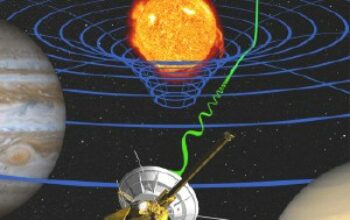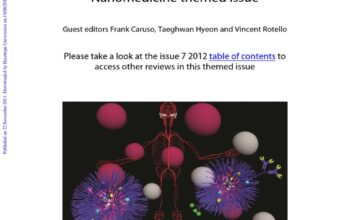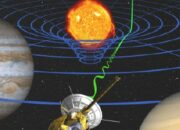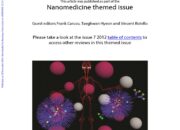In the contemporary scientific milieu, the phenomenon of data proliferation has transcended mere numerical accumulation; it has engendered a transformative paradigm in the realm of physics. This cornucopia of information, characterized by its vastness and ever-increasing complexity, provides both unprecedented opportunities and formidable challenges. Physicists find themselves navigating an ostensibly boundless ocean of information, poised to unearth pivotal insights that could redefine our understanding of the universe.
The advent of advanced computational techniques and expansive data storage capacities has spawned an era often referred to as “Big Data.” In physics, this transformation manifests through enhanced data collection methods; experiments at particle accelerators, astrophysical observations from orbital telescopes, and extensive simulations in condensed matter physics all generate copious amounts of data. The scale can be overwhelming, yet the potential to derive meaningful interpretations from such an extensive dataset is revitalizing the field.
Historically, physics has thrived on the empirical validation of theories. The collection of data was often limited, and theoretical frameworks could be thoroughly tested against available experimental results. However, the current deluge of data necessitates a paradigm shift where hypotheses must converge with large-scale datasets. This synthesis produces novel insights, frequently revealing correlations and patterns obscured under more orthodox analytical techniques.
Catalyzing this evolution is the development of sophisticated algorithms and machine learning techniques. These technologies allow physicists to sift through enormous datasets with remarkable efficiency. Techniques such as clustering, regression analysis, and neural networks have become invaluable tools for extracting salient features from complex data landscapes. For instance, the implementation of machine learning in the analysis of data from the Large Hadron Collider has expedited the identification of elusive particles, thereby enhancing our comprehension of fundamental interactions.
Moreover, the integration of interdisciplinary approaches has burgeoned in response to the pressing demand for data interpretation. Physicists increasingly collaborate with data scientists, mathematicians, and even domain experts from fields as diverse as biology and social sciences. This confluence of different methodologies fosters innovative perspectives, enabling researchers to confront intricate problems with multifaceted solutions. The result is a richer theoretical framework where physics intersects dynamically with other domains—a veritable symbiosis that could lead to groundbreaking discoveries.
Nonetheless, the spiral of data abundance does not come without its pitfalls. The challenges presented by the sheer volume and complexity of data necessitate careful consideration regarding data quality and integrity. Issues such as noise, biases inherent in data collection, and the potential for overfitting models underscore the importance of adopting robust statistical methodologies. Thus, while the opportunities for insight are magnified, the dangers of misinterpretation loom larger, necessitating a judicious approach to data analysis.
In addition to challenges pertaining to data integrity, another crucial consideration is the reproducibility crisis that plagues many scientific disciplines, including physics. The overwhelming propensity of data can sometimes eclipse methodological rigor, leading to findings that are difficult to replicate. Addressing this crisis demands a commitment to transparency and open data practices. The establishment of comprehensive, publicly accessible databases serves as a remedy that not only bolsters reproducibility but also imbues the field with greater collaborative spirit.
The promises of data-centric approaches extend beyond immediate scientific inquiry; they extend into the realm of predictive analytics. The application of data-driven models enables physicists to forecast phenomena, anchoring theoretical insights in empirical viability. For instance, in cosmology, data from the cosmic microwave background radiation has been meticulously analyzed to bolster our comprehension of the universe’s expansion. Such predictive power can catalyze new questions and explorations, expanding the horizons of fundamental physics, as phenomena that once seemed peripheral can now emerge as pivotal areas of inquiry.
As physicists swim in this ocean of information, one must also consider the ethical dimensions associated with data utilization. The responsible use of data encompasses not just the ownership of knowledge but fundamentally influences the trajectory of scientific advancement. An ethical framework guiding the acquisition, dissemination, and interpretation of data serves as a guiding principle in mitigating potential misuses. As such, this is vital, particularly in a global context where decisions based on data can significantly influence societal outcomes.
Additionally, the intellectual pursuit of physics itself is undergoing a renaissance stimulated by the omnipresence of data. The process of questioning and exploring has never been more invigorating, as new technological tools spark curiosity about previously uncharted territories. Each dataset serves as a Pandora’s box, offering varied and extensive questions that prompt the physicist to explore not just the physical realm but the underlying principles that govern it. The resulting questions challenge prevailing assumptions, urging a reevaluation of long-cherished paradigms and compelling physicists to expand their investigatory horizons.
In contemplating the trajectory of physics within the context of an information-drenched environment, the emphasis on collaboration, transparency, and ethical engagement becomes paramount. These principles form the bedrock upon which a resilient future for physics can be constructed, allowing scholars to harness the full potential of data while being mindful of the complexities involved. Ultimately, as physicists engage with the inexorable tide of data, they are not merely passive recipients of information; they are empowered explorers through the vast, uncharted waters that this new age offers.








